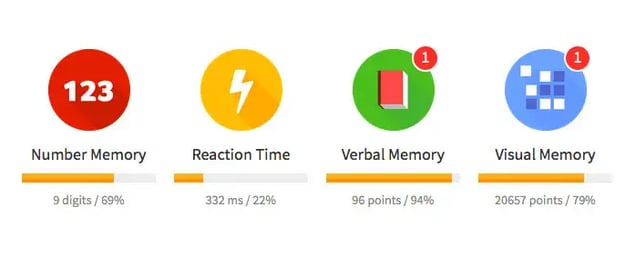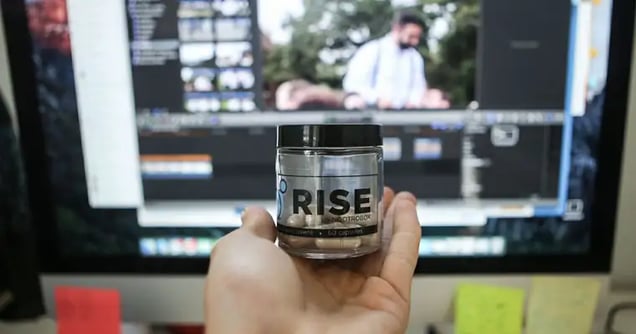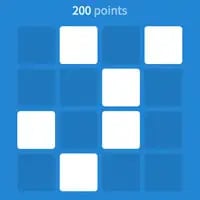Our human guinea pig, Josh Helton, spent the last four weeks taking a daily nootropic from Nootrobox. The goal was to enhance his brain, boost productivity, and have a better quality of life. Andreessen Horowitz just invested $2 million in Nootrobox, which demonstrates how seriously venture capitalists are taking the smart drug movement.

Josh’s results are in, and we’re combining his four-week trial into one epic story for you to enjoy.
If you want to read this in sections, click here for episode 1, episode 2, and episode 3.

My reasons for taking smart drugs
Drugs? Enhanced cognitive ability? Legal? I was intrigued from the get-go.
A few weeks back, a friend told me about the growing world of “nootropics” – a.k.a. vitamins for the brain. Described as “smart drugs,” these pills claim to be a steroid shot for our biological make-up. They do this by combining stimulants such as caffeine, vitamins B6 and B12, fish oil and more in order to give a cognitive booster.
Nootropics are hugely popular in the Silicon Valley and San Francisco as startup founders try to find ways to gain an edge over the competition – and push themselves to their full potential.
While I’m just a guy living the simple life in the woods, I found myself fascinated by the prospect of adding a little kick to my neural pathways. I ordered a 30-day supply.
There are a bunch of different nootropics out there, but I chose Nootrobox, a startup based out of San Francisco, as I liked its simple approach. Nootrobox has three products: Rise, Sprint, and Yawn. Rise is a daily nootropic to take every morning. Sprint is for short-term but highly-concentrated lock-ins (taking a test, writing your thesis, playing Mario Kart), and Yawn is… well, take your best guess.
Measuring the effect on my brain
I’m using different cognitive testing websites to track my mental agility over this time period. They’re all similar in nature, asking me to remember words and patterns, type a color instead of the word, and other tests that require me to mentally dial in. I know that repetition will influence my results, but I’m hoping that by combining a number of tests I’ll still be able to get an overall view of any progress.
The tests I used:

Day 1: Disappointingly normal
I started my day with two Rise tablets. At first I was taken aback by the size, as they’re easily the largest pills I’ve ever swallowed. But they went down easily with a glass of water. BOOM! Instantly, colors started fluctuating, the ground was shaking, and I saw hallucinations in my backyard.
I wish.
Of course, nothing crazy happened instantly — or at all, for that matter. Today was a hard day to notice any effects as it was insanely busy. I shot a couple live music videos, which required some on-the-spot thinking.
This made me think of the famous quote by Stephen Hawking, “I regard the brain as a computer which will stop working when its components fail. There is no heaven or afterlife for broken down computers; that is a fairy story for people afraid of the dark.”
If my brain is a computer, how do I make it run the most efficient way possible, for as long as possible? I did feel locked-in today. But I didn’t notice any major cognitive changes.
Day 3: Mastering my focus
I finally had the chance to sit down and do some work at home. I started the day with my two pills after eating yogurt and granola for breakfast. Nootrobox recommend eating a meal with fat in it to absorb the pills better.
Today my work is editing a wedding film at home. But, as any self-employed person knows, it’s a struggle to avoid distraction.
Checking emails, Facebook, fantasy football, finances, re-checking Facebook, then more fantasy football research… I don’t usually feel very efficient. Today felt different. I opened Final Cut Pro and found myself spending a significantly longer time than normal editing without distraction. I love my work, but on a normal weekday I find myself “needing” regular distractions.
Today I got a solid hour where I was completely dialed in. Not just focused, but genuinely happy and eager to hack away at my workload.

I’ve been trying to measure any changes in cognition by using a number of online tests.
Before starting Nootrobox, I tried Quantified Mind, a free web tool, recommended by Reddit brain hackers. It says it “reliably, and comprehensively measures your basic cognitive abilities.”
My score before starting this process was 545.658 in Verbal Learning with Replacement. This test requires you to recall a series of words. But my score dipped to 515.358 today, possibly because I was tired.
Day 5: Tired and lost
Last night, I saw one of my all-time favorite bands, Caspian, play in Nashville. It was an exhilarating, even spiritual experience. Their music does that, but I wondered if the drugs I was taking played into my epic feelings.
I returned home around 1 a.m., and woke up at 5 a.m. I was scheduled to run a 5k this morning. The plan was to pop the pills, pick up my friend Dave, and head to the race. But no cognitive enhancement could have spared me from the effect of exhaustion. I took the wrong interstate for 30 miles. I showed up to the start line just as the announcer said, “Thirty seconds to go!”
I pinned my bib, and off we went. And I didn’t do too badly. Later that day I coached a high school cross country team.
Overall, I had a lot of activity today, but had an excessive amount of energy and focus.
I mentioned that one of the tests I’m using is the Human Benchmark test. Their Reaction Time test is simple but interesting. The objective is to click the mouse when the screen changes from red to green. Before I started the drugs, I averaged 367 milliseconds over five tries. On day three, I already had the time down to 325 milliseconds. However, it was back up to 377 milliseconds the next day. Five attempts isn’t a great deal of information to draw from, though.
Day 7: Open minded and musical
Today I was feeling the effects of the pills. I had an antsy, eager desire to plow through my work. I always want to give my very best, but today I felt excited about working on my projects. And I felt like this all day.
I appreciated the music I was listening to (Caspian), and I appreciated the video I was working on (I tend to be skeptical when I watch my work). Things seemed more beautiful today. It’s also a beautiful fall day.
I want to talk a little about the tests I’ve been taking and the results I’m getting. Bearing in mind this quote from Richard Dawkins:
“By all means let’s be open-minded, but not so open-minded that our brains drop out.”Richard Dawkins
I’m not basing my experiences just on my results, but I can’t deny that they factor into my evaluations.
One of my favorite tests is an iPhone brain training app called Peak. They provide the least amount of data regarding progress, but through their Pro version I can see a chart that tells me if I’m progressing or regressing. Overall, my brain score went from 354 to 382 in the first week.
 Then there’s the Quantified Mind tests. The scoring was a bit confusing at first (my first time taking it, I scored a 545.658 +/- 35.801 … what?!), but I gathered this after referring to their FAQs: “The scores summarize the multiple aspects of each tests into a single number, where higher is better.”
Then there’s the Quantified Mind tests. The scoring was a bit confusing at first (my first time taking it, I scored a 545.658 +/- 35.801 … what?!), but I gathered this after referring to their FAQs: “The scores summarize the multiple aspects of each tests into a single number, where higher is better.”
The Visual Memory Quantified Mind game displays a grid of anywhere from 3×3 squares to 8×8 and even bigger. It’ll flip over a pattern of selected squares for a couple seconds, then go blank and you are to recall the pattern. On day one of Nootrobox, I scored 14,868 points. Day three I was at 24,648. And day seven I hit 31,419. So there definitely seems to be a noticeable, progressive increase of retention as an effect of Nootrobox in my system!
Day 8: Morning brain drain
Today was pretty average, but one difference was that I took my cognitive tests first thing in the morning. I was trying to take some inspiration from William Blake…
“Think in the morning. Act in the noon. Eat in the evening. Sleep in the night.”William Blake
That might work for him, but my scores suggested that I need to give some time to let my senses and the nootropics kick in. My Visual Memory score plummeted to 15,203 after being over 30,000 a couple of days ago. And my Reaction Time was 353 milliseconds, far slower than most days during the first week.
For reference, Reaction Time is measured in milliseconds. The Human Benchmark Test said the median reaction time is 258 milliseconds, and average reaction time is 269 milliseconds, based off 22,893,062 clicks.
I’ve found that I’m not as driven or as focused in the morning. I suppose it differs for each individual, but my brain seems to enjoy easing into the day, and not being challenged before I’ve eaten breakfast.
Day 12 and 13: Stressful situations
These days were tricky. Circumstances meant I had to deal with mentally challenging events, and work on my focus and endurance.
My wife and I make wedding photos and videos together, and this weekend we landed back-to-back wedding shoots. That’s 10-12 hours of running around and documenting as much as possible. The days go by in the blink of an eye. As the person responsible for preserving the memory of the day, I’m constantly thinking on my toes to anticipate moments and avoid missed opportunities.
Typically I’m mentally wiped after just one full wedding day, so I was curious what two in a 48-hour period would do to me.
However, both couples were awesome to work with, and I found myself in high spirits both days… not running on empty. I felt the same way I had felt editing the films last week: a joyful alertness and consistent positivity to do my best. My thoughts never slipped to wondering when the day would be over, or how long until I got to eat food. Overall, I was simply in the moment and striving to create the best art I could.



Day 15: Superbrain to the rescue
This is where it got interesting. I head into town every week day to help coach cross country at a local middle school. The practice finished without a hitch, so I headed home to join my wife for a home-cooked meal.
She greeted me with a big ‘Welcome home!’ from the kitchen. She was standing by the stove, and I could hear something sizzling in the pan. I was taking off my shoes when my hungry self couldn’t help but notice the sizzling sound was getting louder.
And louder and louder.
I yelled, “Wow – sounds like you’re really whipping something up!” to which Jess replied with screams. In the reflection in the kitchen window, I could see giant flames towering from a cooking pan held in her arms. I sprinted in and grabbed the pan from Jess, who was frozen with fear.
I threw the pan into the sink, turned the water on (in hindsight, this was a bad idea) and the four foot flames were extinguished. Needless to say, we both were amazed that there was no harm done to our home or to Jess.
 In part, we know angels were watching over us that day. And I thank the nootropics for giving me mental clarity and alertness in that moment. I know without a doubt they helped me make a crucial decision in a moment of panic.
In part, we know angels were watching over us that day. And I thank the nootropics for giving me mental clarity and alertness in that moment. I know without a doubt they helped me make a crucial decision in a moment of panic.
In spite of lackluster test scores, I ended the week on a positive note. My Reaction Time hit a new record of 309 milliseconds on day 14, and I was also at 325 milliseconds and 320 milliseconds on days 11 and 13, respectively. Compared to 367 milliseconds before starting the experiment, this is a significant improvement.
I also recalled a 13-digit number in the Number Memory test. I started at 12-digits. However, scores here seem to depend on luck. I look for patterns, so if a number has something like a “333” or “5959” in it, it’s easier to recall. Completely random strings of numbers are much harder.
Also, in the Quantified Mind test, my Verbal Learning score raised to 632.542. This has to do with recalling words seen at the very beginning of the games, up to 10 minutes beforehand.
With the Peak app, I’ve seen my overall Brain Score gradually increase. My score in the Mental Agility category has risen steadily. However, I have not seen improvement in Language or Problem Solving. Those are not my strengths in general – even without nootropics – so that could factor in.
Day 17: High-speed reactions
Today provided another high-intensity situation that required decisive decision making.
I help teach a local middle school P.E. class. It was our weekly game day, and we were playing Capture The Flag.
It had rained that morning and the grass was still wet. One 8th grade girl took it upon herself to guard the flag; she was not going to let any intruders close. As she was chasing down a flag bandit she took a sharp turn and lost her footing on the wet grass. She slammed her head on the ground, and before I knew it, she lay motionless. Everyone in the class gathered around.
And we were off campus today. I felt mind-numb at first. Then a million questions raced through my brain: Do I call an ambulance? Do I sprint a mile back to campus as fast as I can, leaving the other kids here? Do I send a kid back to get help? It also occurred to me that it was the end of class, and the other students needed to get back.
I steadied my mind for a second then called the shots. The students who wanted to leave could, but I needed a few of them to stay with the fallen girl. I was going to sprint back in my jeans. Huffing and puffing, I made it, and drove a cart back to transport her to the school for a diagnosis.
It ended up being a minor concussion, nothing to be too concerned about. Needing to make decisive decisions for a large group of people is a situation I don’t often find myself in.
I thank my enhanced mental state for helping me sort out my thoughts and stay focused instead of panicking and delaying my reaction.
In light of this situation, the rest of the week seemed pretty dull. I am playing catch-up with video work right now, so I spend a lot of time editing. I still notice an edge in my focus – I manage long spurts of intense work without needing a social media distraction.
Day 25: Memory tricks
“Yesterday is but today’s memory, and tomorrow is today’s dream.” I find this Khalil Gibran quote helpful when looking at how far I’ve come over the last month. In some ways, I don’t notice that many changes, but when I start testing myself I’m aware of how much I’ve improved.
On the Human Benchmark test, I almost passed level 11 in number memory, which is pretty average for me. My low is usually 9 or 10 strings, my best has still been 13.
However, my reaction time did hit a new best of 272 milliseconds. But this is based off the average of five tests, and one of them was an outlier at 33 milliseconds – almost luck one would say. My 156 and 18,359 in Verbal and Visual Memory, respectively, were below average.
Day 30: Four-week finale!
At this point, the newness and excitement of taking smart drugs have worn off. I’ve slid into a state of questioning everything about it. Comments from readers have made me question if the nootropics are actually helping my scores increase on the tests or if this is simply a result of repetition. I’m keen to believe the latter.
I think about my friends over the years that have been on medications such as Ritalin or Adderall – drugs commonly used to increase attention and focus, especially in those diagnosed with ADHD. They describe a noticeable change of consciousness – an overly ambitious and one-track-minded desire to accomplish the task at hand.
I anticipated this sensation as I began smart drugs based on how they are advertised, but sadly this was not the case. If the pills were slipped in my food without me noticing each morning, I would never know they were in me. Perhaps this is the point. To give a subtle boost without a distracting high.
The takeaway
If subtle results are the overall goal, I’d rather save the $50 a month and make small changes that will have the same effect as taking Nootrobox.
Examples would be: making sure I had fewer distractions to bother me, a better working regiment, and training my brain to stay positive and focused.
I have nothing negative to say about my experience on smart drugs other than it was almost no experience at all. If the placebo is the driving engine behind them, then I can think of other ways to kickstart my cognitive ability and keep the extra money in my pocket.